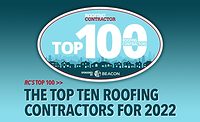2011 Top 100 Roofing Contractors

| 2013 | 2012 | 2011 | 2010 | 2009 |
Click here to view the 2011 Top 100 Roofing Contractors.
Click here to view the Expanded Top 100 List.
They set themselves apart from the rest of the industry not only because of the revenue they generate, but how they positioned themselves to stay on top. The contractors on Roofing Contractor's Top 100 list know what it takes to remain successful in tough times and in good times.

They set themselves apart from the rest of the industry not only because of the revenue they generate, but how they positioned themselves to stay on top.
The contractors on Roofing Contractor's Top 100 list know what it takes to remain successful in tough times and in good times.
Chris Lowe, President of Kidd Roofing in Austin, Texas, said 2010 was a challenging year, as it was for most companies in construction.
“We worked hard to trim our overhead, which helped a lot,” Lowe said. “We also did more jobs out of town and even opened up new offices in Oklahoma City and Dallas. We focused more on building our re-roof customer base, which is not always driven by economic factors, but by storm activity. This helped offset the downturn in new construction.”
Kidd Roofing handles all types of jobs, no matter the size. “Whether we are the roofing contractor on a large commercial job such as Austin City Hall or DKR Memorial Stadium, or we are installing a simple three-tab residential roof, we pride ourselves in being able to handle it all and keep our workmanship at a high level.” Lowe said. “We are always looking for ways to expand our business. We not only are a roofing company, we also install and manufacture metal wall cladding (and) are also about to venture into selling and installing solar roof panels.”
Nushake Roofing Inc. has always focused on re-roofing and commercial roofs, so when the new construction got hit hard it did not have a dramatic immediate affect on the company.
“We are located in Manteca, (Calif.), which is centered in the third largest population hub in the U.S.A.,” said Doug Heath, CEO and President of Nushake Roofing. “Only New York and Los Angeles have a larger population within a 150 mile radius.”
Heath said the company expanded its coverage area to keep enough work coming in and to continue making a profit. “With the high price of gas and the increased material costs - along with the competitive market - the biggest downfall that I see is that I have been unable to give raises to my men who work so hard putting on roofs,” Heath admitted. “With the new OSHA fall protection that went into effect my costs has gone up even more. So for now, Nushake Roofing remains in the survival mode till the pent-up roofing market opens up again.”

Chris Nussbeck, CEO for Aspen Contracting in Lee’s Summit, Mo., said the roof restoration industry in general is not only weathering the economic storm, it is thriving.
“Mother Nature has given us an incredible amount of work to do lately,” Nussbeck said. “Serious roofers, like Aspen, who are geared up to quickly and efficiently respond to wind and hail storms around the country are doing particularly well.”
At Aspen, the company spends a great deal of time, money and thought anticipating and preparing for major storm events through training and certifying their people, and building mutually respectful relationships with insurance carriers and materials suppliers.
“And when the storms do come we take advantage of them, not just to make a quick buck, but to expand our reputation for quality work and for employing higher standards in roofing,” he said. “In an industry that has been repeatedly tarnished by the irresponsible practices of a few, that simple approach has brought Aspen more work than ever before.”
Stuart Parsons Jr., President of Parsons Commercial Roofing, in Waco, Texas, said there are several reasons why his company is doing well in a down economy, including working harder and smarter and recruiting top salesmen.
“There is always going to be business somewhere, we find a way to get our share, we just have to give our story and we can sell most jobs,” Parsons said. “We don’t wait for the phone to ring and our marketing department is always working together to help us grow.”
“Another big thing was taking our home headquarters base in central Texas to the Dallas-Fort Worth metropolis of eight million,” he continued. “We want to be a household name not just in a 60 mile radius but 150 where there are more people.”
Parsons said being in business since 1948, many employees have been with the company up to 45 years, and 30 years is not uncommon with some veterans.
The company's philosophy is to put the customer first, according to Parsons. “We install a roof, mostly thermoplastics, with 15-year warranty, we get callbacks like many do, cuts, other parts of building leaking, we show up, it's not under warranty, we send a bill that says, ‘No Charge.’ This philosophy has always been in company and our goal is for the costumer to say, ‘Parsons is my roofer.’”
Commercial Roofers, Inc. of Las Vegas has been doing well in a tough economy primarily because the company anticipated the downturn and planned for it.
“We entered the downturn with sufficient capital reserves and a solid back log of quality projects,” said Scott Howard, Principal of Commercial Roofers, Inc., along with Dennis Conway. “Additionally we have continued to focus on our quality client base and work to maintain and expand the client base. As the economy has continued to struggle we have had to move to a more aggressive market strategy.”
One of the qualities that make CRI unique is the company’s commitment to be a good corporate citizen.
“To that end we have and continue to actively participate in industry organizations, fund a Scholarship at the UNLV School of Architecture and participate in local and global charitable organizations we have confidence in,” Howard said.
Steve Little, President of KPost Company in Dallas, said the company’s success is driven by its employees.
“We have an awesome team of professionals who are highly dedicated and driven to succeed,” Little said. “We’re committed to capturing market share with our service department’s focus on roof assessment and asset management collecting rooftop data and providing annual budgets, growing our LWIC decking division that helped us VE jobs to a competitive advantage and educating current and potential clients with quarterly seminars on preventive maintenance in servicing roofs, value engineering roofing options.”
KPost Company, which opened its doors in 2003, did not have a choice to buy into the recession. Instead, they formed their own unique brand.
“Our sales team is independent of our estimators and only sells and markets KPost,” Little said. “We use digital media to market our brand of safety-quality-value. Every decision we make is based on long term ROI (Return On Investment) like our apprenticeship program where we bring college grads into the company and they work in all areas from labor to estimator over two years. That’s a $100,000 investment in our future before this person is incorporated into the company.”
Brad Kupper, Business Development Manager for Bone Dry Roofing, Inc., in Indianapolis, Ind., said the company’s attention to customer service and quality workmanship has helped it to continue to prosper in a bad economy.
“We believe that our ability to offer customers more than just roofing and our focus on the customer allows us to stand out from other roofing contractors,” Kupper said.
Click here to view the 2011 Top 100 Roofing Contractors.
Click here to view the Expanded Top 100 List.
Looking for a reprint of this article?
From high-res PDFs to custom plaques, order your copy today!





